Are pet rabbits affectionate? Yes, pet rabbits can be affectionate, but they show their love and trust in subtle ways. Unlike cats and dogs, rabbits may not immediately appear affectionate. This article will help you understand how rabbits express their affection and the signs to look for to recognize your bunny’s love.
Key Takeaways
-
Rabbits express affection in subtle ways like grooming, circling your feet, and flopping down nearby, indicating trust and comfort.
-
Building a strong bond with your rabbit involves patience, understanding, and creating a safe environment, as they tend to fear being held.
-
Different rabbit breeds like Himalayan, Flemish Giants, and Mini Lops are known for their affectionate nature, but individual personalities can vary.
Understanding Rabbit Affection
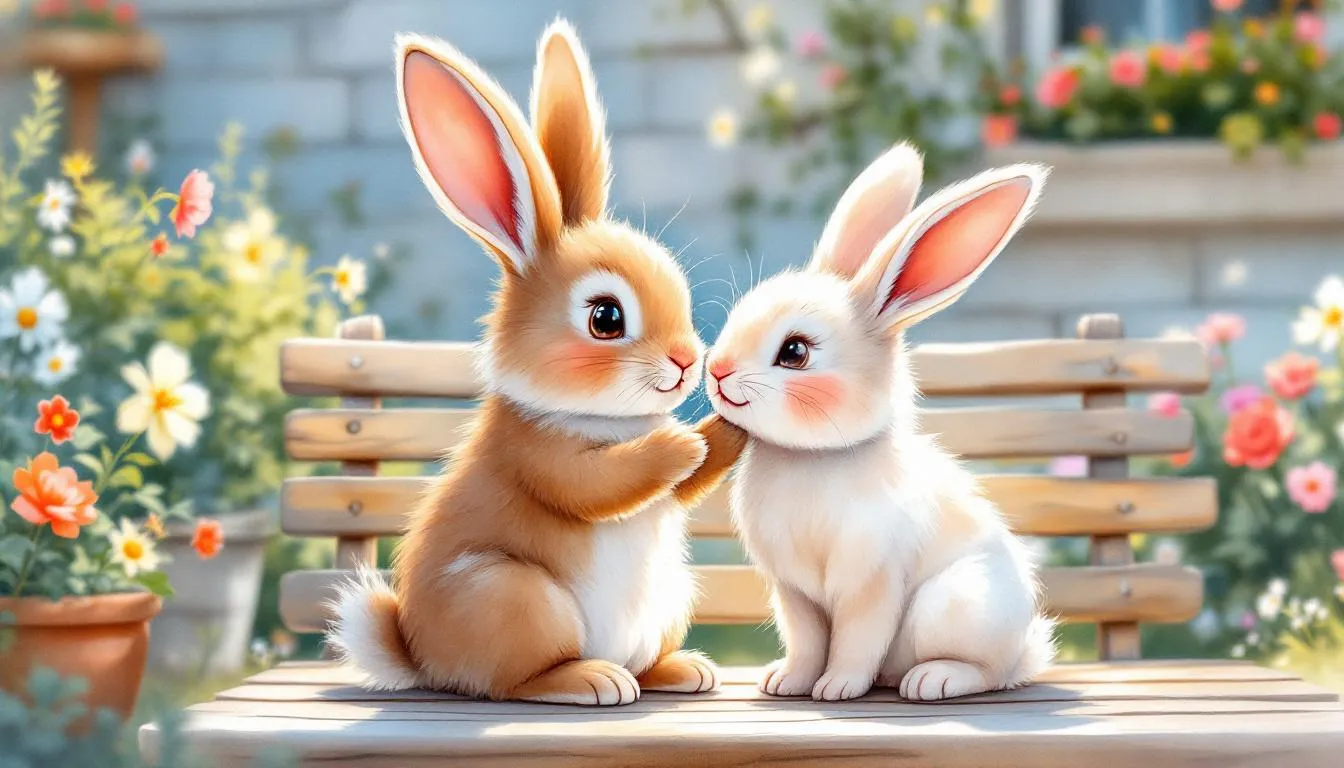
Rabbits are prey animals, which means they naturally fear many things, including predators. This inherent natural fear influences how they express affection. Despite this nervous nature, pet rabbits can still become affectionate pets, often preferring the company of humans once they feel safe.
Unlike the overt gestures of cats and dogs, rabbits show affection in more subtle ways. A rabbit shows affection through behaviors such as sitting close to you, grooming you, or simply lying down near you. These small gestures are their way of saying they trust and care about you. A binky, a joyful leap often accompanied by a twist, is another universal sign of rabbit happiness, often showcased when they are excited to see you. Understanding rabbit body language is crucial to recognizing these signs of affection, as a lack of knowledge can lead to missed signals and misunderstandings.
Socialization and treatment from birth heavily influence a rabbit’s friendliness and affectionate behavior towards humans. It’s important for rabbit owners to recognize and appreciate these subtle signs to build a strong, affectionate bond with their bunnies.
Signs Your Rabbit Loves You
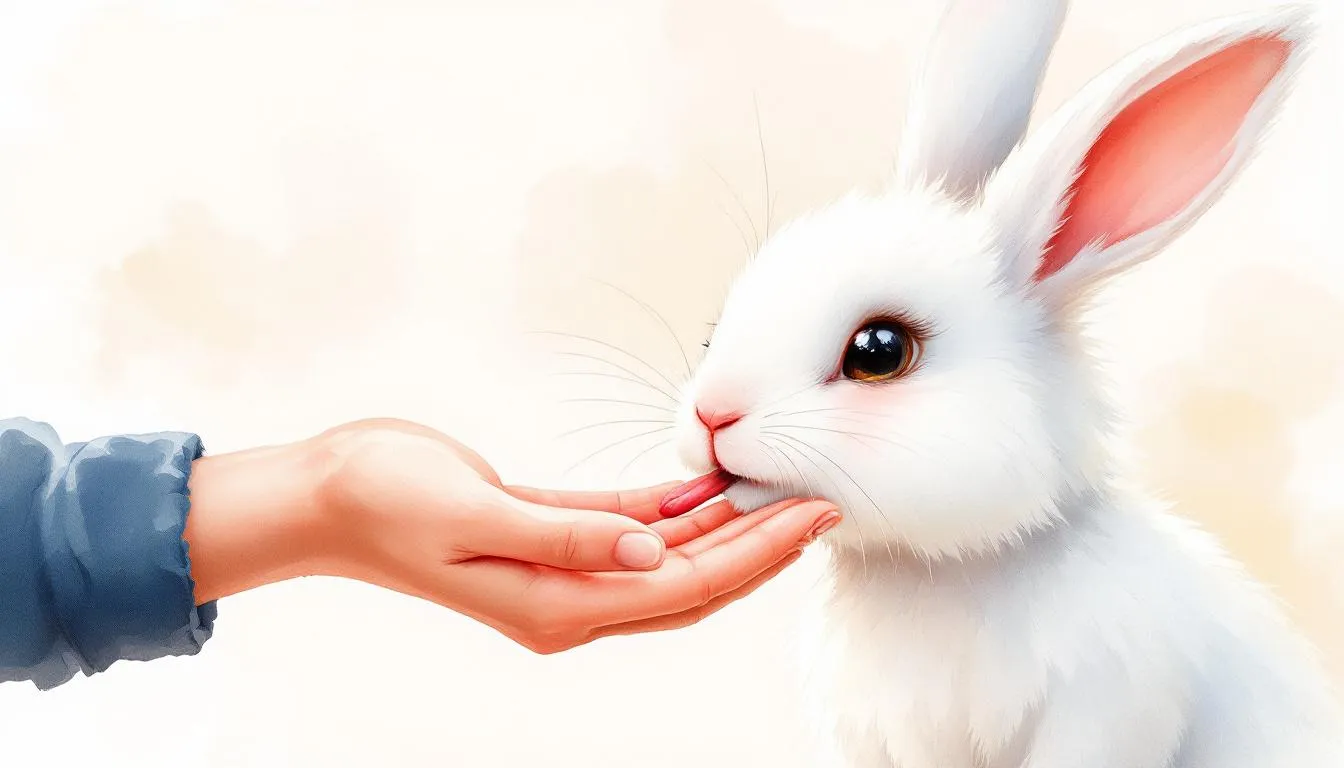
Knowing your pet rabbit loves you is heartwarming, but how can you tell? Rabbits demonstrate affection through actions like nuzzling, licking, and choosing to be near you. When a rabbit approaches or nudges you with its nose, it often seeks your attention and affection.
Three major signs of rabbit affection are grooming you, circling your feet, and flopping down near you. Here’s a closer look at each of these behaviors.
Grooming You
One of the most endearing ways a rabbit shows affection is by grooming or starting to lick its owner. This behavior indicates trust and love, akin to how rabbits groom each other. When your bunny licks your hand or face, it treats you as part of its social group, a sign of earned trust.
Rabbits groom to show affection. When your bunny grooms you, it’s a clear sign of love and security. So, the next time your rabbit licks you, know it’s expressing its fondness in the only way it knows how.
Circling Your Feet
When rabbits circle your feet, it’s often a sign of excitement and affection. This behavior, which can resemble a play chase, indicates that your bunny is happy to see you and enjoys your company, especially when they are showing off their hind foot.
It’s their way of saying, “I’m glad you’re here!”
Flopping Down Near You
A rabbit flopping down nearby clearly indicates it feels secure and totally relaxed in your presence. This behavior shows your bunny trusts you completely and is comfortable enough to let its guard down. When a rabbit flops down, it’s essentially saying, “I feel safe with you.”
If your rabbit climbs on you after flopping down, it’s looking for some gentle strokes on the back. This act of lying down and seeking petting is a testament to the trust and affection your rabbit has for you, as it may also want to cuddle.
How to Gain Your Rabbit’s Trust
Building a relationship with a pet rabbit requires effort, patience, and understanding. Trust is the foundation of any strong bond with your bunny. Approach bonding with appropriate care and patience, keeping in mind that each rabbit has a unique personality. It may take weeks or even months to earn their complete trust, but the effort is well worth it for a rewarding relationship.
Getting down to your rabbit’s ground level can facilitate better bonding. Speaking softly helps your bunny feel secure and fosters a connection. Offering small treats creates positive associations, making your rabbit more likely to trust you. Most rabbits prefer gentle strokes on their cheeks, forehead, and behind the ears, while they generally dislike being touched on their belly or feet.
Engaging in play and mimicking social interactions can further strengthen your bond with your rabbit. Consistently using these strategies will help create a strong bond, allowing you to spend time with your rabbit and make it feel secure and loved.
Most Affectionate Rabbit Breeds
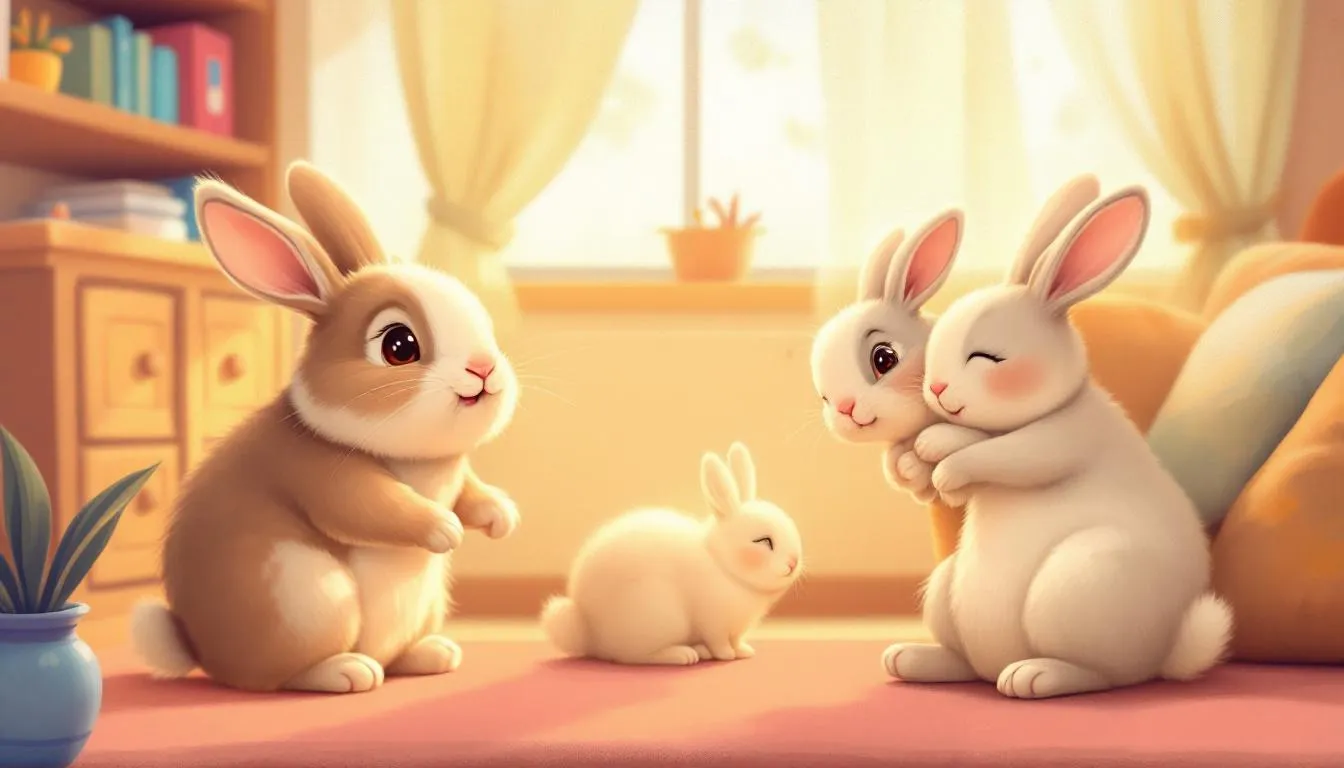
Certain rabbit breeds are recognized for their affectionate nature, making them great companions. For instance, Himalayan rabbits are known for their gentle nature and thrive in calm environments. Flemish Giants, despite their large size, are renowned for their docile, affectionate personalities.
Rabbit breeds and their personalities:
-
Netherland Dwarfs: Although small, they have lively personalities and often enjoy close interactions with humans.
-
Californian rabbits: Friendly and often enjoy cuddling and social interaction.
-
Mini Lops: Playful and friendly, making them a popular choice among rabbit owners.
Rex rabbits are characterized by their soft fur and gentle temperament, and they tend to bond well with their caretakers. While certain breeds may be known for affection, all rabbits are individuals, and not every rabbit will reflect its breed’s stereotype.
Do Rabbits Like to Be Held?
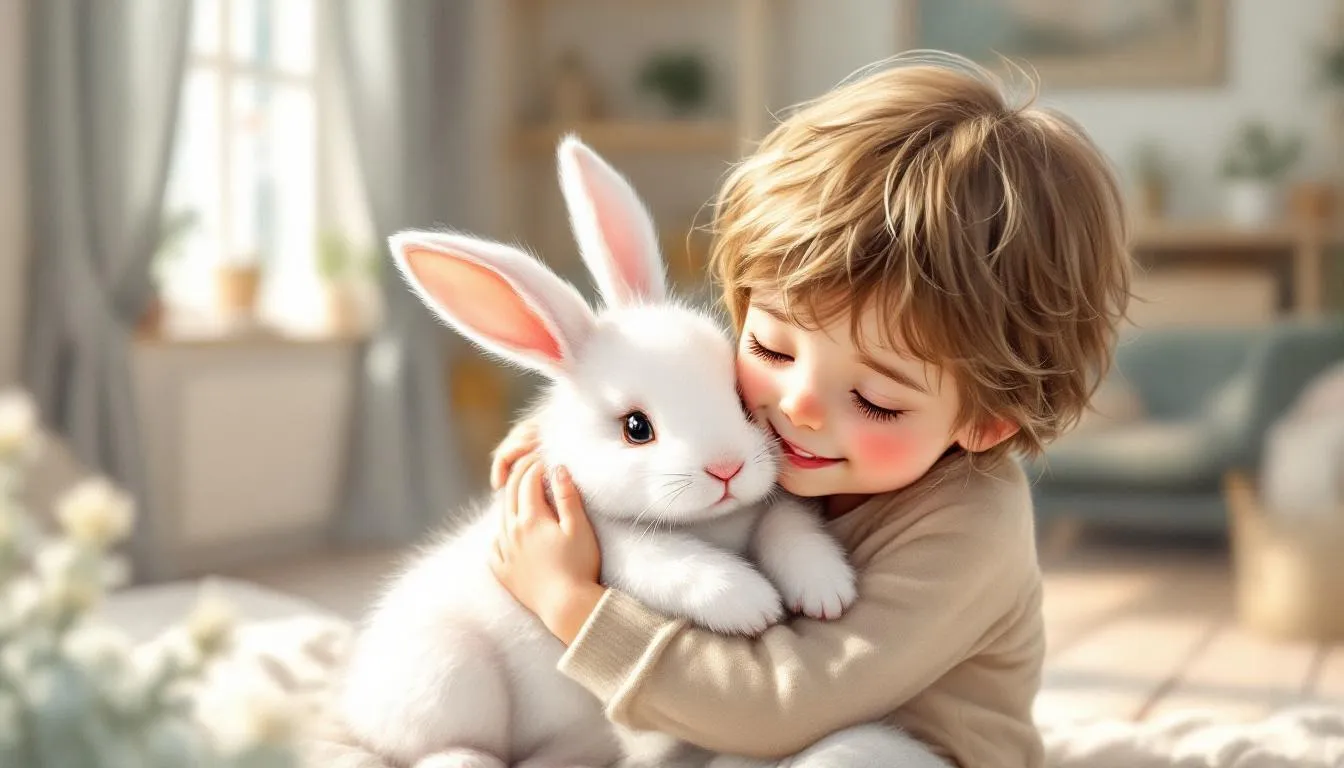
Do most rabbits like to be held? Generally, no. Rabbits prefer not to be picked up but enjoy physical affection and companionship in other forms. If a rabbit is willing to be petted, it suggests they are not afraid of being held, but that doesn’t mean they enjoy it.
Holding a rabbit can be stressful for them due to their prey instincts. If a rabbit grinds its teeth while being held, it may be a sign of being scared. Understanding and respecting these preferences is crucial for building a trusting relationship with your bunny.
Creating a Safe Environment for Affection
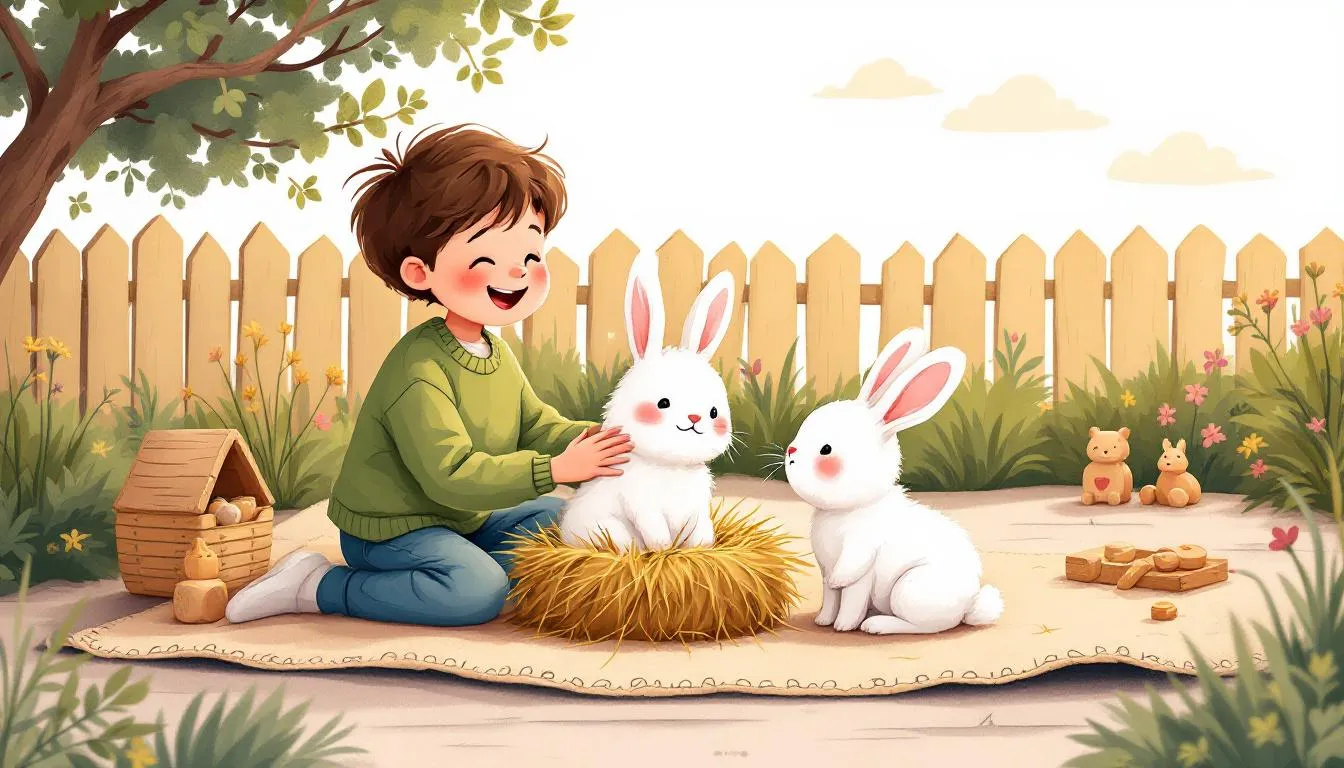
A safe environment is crucial for a rabbit to express affection. A spacious indoor hutch or playpen with a non-slip floor is recommended for rabbit housing, allowing your bunny enough space to move around and feel secure in the room.
Rabbits need a comfortable resting area with soft bedding to mimic their natural habitat. Providing various toys, such as chew toys and puzzle feeders, keeps rabbits mentally stimulated and happy with food.
It’s also important to bunny-proof your house by removing hazards like electrical cords and toxic plants. Keeping a rabbit outdoors in a cage may prevent them from bonding with its owners and create unsafe conditions.
By ensuring a safe and comfortable environment, you foster a space where your rabbit can show affection freely and enjoy free roam.
Rabbit Body Language: What to Look For
Rabbits communicate their feelings primarily through their body language and eyes, which can be subtle but telling. Some common signals include:
-
Lying flat on their stomach with legs stretched out, indicating relaxation and comfort.
-
Holding their tail high, which usually suggests happiness and confidence.
-
‘Binky-ing,’ or jumping and twisting in the air, indicates a state of joy and excitement.
When rabbits purr, a soft grinding of their teeth, they are relaxed and content, often because you are petting them.
-
Lying flat on their stomach with legs stretched out, indicating relaxation and comfort.
-
Holding their tail high, which usually suggests happiness and confidence.
-
‘Binky-ing,’ or jumping and twisting in the air, indicates a state of joy and excitement.
Conversely, a rabbit thumping its hind legs usually signifies that it is feeling threatened or anxious. Recognizing these cues helps you respond better to your rabbit’s needs and emotions, strengthening your bond.
Common Misconceptions About Rabbit Affection
Many people mistakenly view rabbits as boring pets because they do not show affection in conventional ways. Rabbit care often involves understanding that rabbits do not express affection overtly, and their subtle cues can be easily startled by their rabbit owner. Unlike cats, many rabbits love to eat to ensure they are healthy, happy, and cute.
A common misconception is that rabbits enjoy being cuddled; however, this can be stressful for them due to their prey instincts. Understanding the unique ways rabbits show love is essential for developing a bond with these animals.
Summary
Understanding and recognizing the affectionate behaviors of rabbits can greatly enhance the relationship with your pet. From grooming and circling your feet to flopping down near you, rabbits have unique ways of showing their love. By creating a safe environment and respecting their preferences, you can build a strong, trusting bond with your bunny. Remember, every little gesture from your rabbit is a sign of affection and trust.
Frequently Asked Questions
How do I know if my rabbit loves me?
If your rabbit grooms you, circles your feet, or flops down close by, it’s a sure sign they love you! These sweet behaviors show your bond is strong.
Do rabbits like to be held?
Rabbits generally don’t like to be held; they prefer other types of affection, like gentle petting or being near you. Respecting their comfort will make your bond stronger!
What are some affectionate rabbit breeds?
If you’re looking for affectionate rabbit breeds, you can’t go wrong with the Himalayan, Flemish Giant, Netherland Dwarf, Californian, and Mini Lop. These breeds are known for their friendly and loving nature!
How can I gain my rabbit’s trust?
To gain your rabbit’s trust, be patient and understanding of their personality while using treats, soft speech, and gentle play. These little steps will help your bunny feel safe and secure around you.
What kind of environment do rabbits need to feel safe?
Rabbits feel safest in a spacious indoor hutch or playpen that has non-slip flooring, cozy bedding, and plenty of toys for mental stimulation. Creating a comfortable and engaging environment will keep your furry friend happy and secure. The minimum size for one rabbit’s living space should be six square feet, but a better rule of thumb is five times the size of the rabbit to ensure they have enough room to move around freely.



